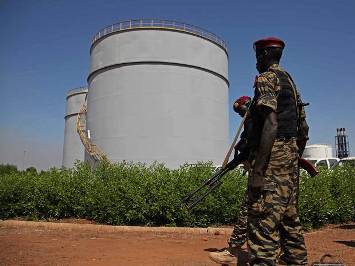South Sudan unveils strategic plan to protect oil fields
April 24, 2017 (JUBA) – South Sudan government has unveiled a strategic plan to protect its oilfield in order to curb sabotage and allay fears of kidnapping by the armed opposition of foreign workers.

“The general security situation in the country is under control except that we’ve observed that some negative forces are bent on sabotaging the activities of the oil production companies,” Gatluak said Monday.
“But the government, through the ministry of petroleum has taken extra steps to ensure that we guard these facilities, including the pipelines, oil platforms and other installations,” he added.
According to the senior South Sudanese official, a large task force that can contain any aggression has already been taken.
“There are enough troops and other security agencies that can face the challenge of the times”, he further told Sudan Tribune.
Cabinet, Gatluak said, has approved a new strategy to improve the security situation around the oil fields to build the confidence of workers.
“The arrangement now is that the deployment to protect oil fields will be in three layers. The first layer will be covered by the army. The SPLA forces will be deployed in the layer, followed by security and then the police as the third layer in the protection of the oil field,” said the presidential aide.
He added, “This arrangement was discussed at the national security council and also at the council of ministers where the strategy was approved”.
The move to protect key installations follows complaints in March by oil companies that they were operating in places extremely at risk of attacks and kidnapping by hostile armed dissidents in the region. The complaints drew the attention of the petroleum ministry and the council of ministers passed a resolution authorising the urgent deployment of troops with their capabilities to oil-rich Unity and Upper Nile regions.
The undersecretary in the country’s petroleum ministry acknowledged that production was facing challenges, but said everything was being done to ensure production level is increased.
“We are faced with the devil on all fronts,” said Mohamed Lino.
“Prices are awfully low, our efforts to increase oil production have been frustrated by attacks and kidnappings by armed groups operating in the area and we finding it difficult to persuade oil workers to go to some places. This is becoming a concern and the government is exerting efforts to address this challenge,” he added.
Since its independence in July 2011, South Sudan has relied on oil for all incomes, a situation that has significantly compounded ongoing political and economic instability due to the fall in crude oil prices.
According to South Sudanese officials, production in the past reached as high as 350,000 BPD (barrels per day) but fell after a dispute with Sudan over fees for pumping South Sudan’s crude through Sudan’s export pipeline, which led South Sudan to halt oil production in 2012.
(ST)
